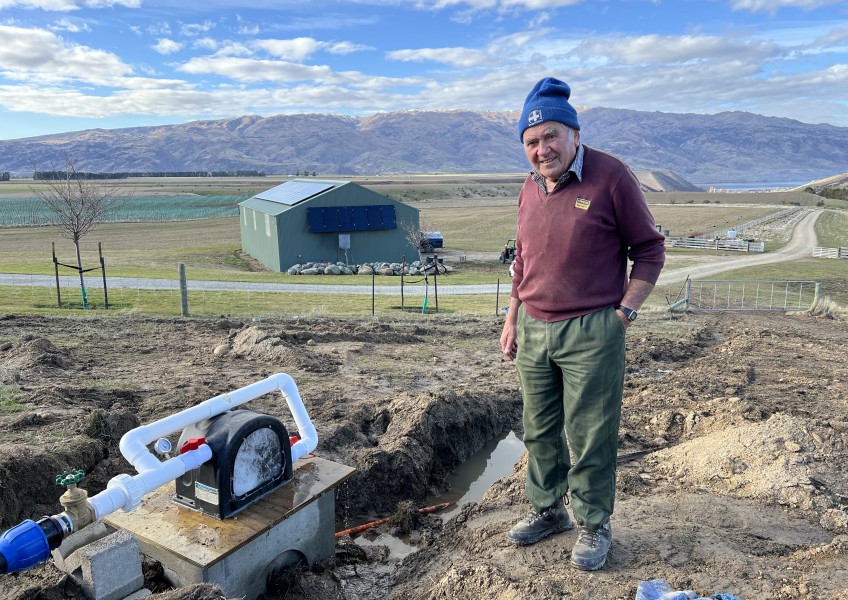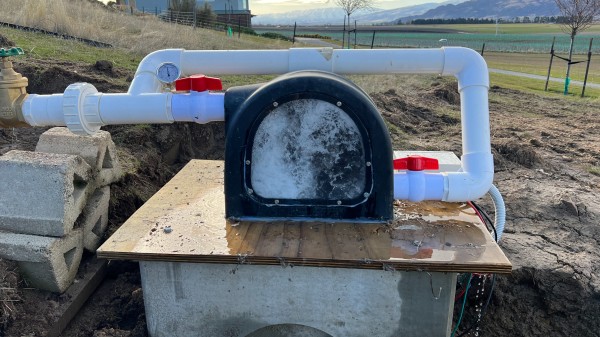Council red tape blocks domestic hydro scheme

A Lowburn resident on a journey to greener off-grid living has hit a regulatory road bump as he tries to ditch his diesel generator in favour of hydro power generation.
Jack Davis has a permitted water take from the Stratford Creek and, when the sun isn't shining, he wants to divert that water through a PowerSpout turbine he's sourced from up Tauranga way.
But the Otago Regional Council has informed Mr Davis his existing consent does not technically allow him to take water from the creek and put it to work turning a turbine.
And that lack of an official tick of approval is causing a headache for Mr Davis and his next-door neighbours.

Jack Davis' PowerSpout turbine on his small holding in Lowburn.
"My wife and I own a small holding in the Lowburn Valley," Mr Davis says.
"We have a house and buildings that are totally off grid and have been for eight years."
The couple have solar panels on the roof of their shed, and heat their water using a mix of solar panels and a wetback fireplace.
But for approximately 150 hours a year on average they rely on a diesel generator to keep their household powered, mostly when the Central Otago's famed sunshine is hidden behind its infamous inversion fog.
For Mr Davis, looking to install a hydro power generation system was a no-brainer - outside of the hot summer months there is no need to irrigate his land, which accounts for a chunk of his water take.
"The ORC has turned us down because our water permit, by their own omission, is only short of two words, 'hydro generation'.
"Our water permit says, 'irrigation, stock water and domestic'. Well, this is about as domestic as you can get."
ORC environmental delivery general manager Jo Gilroy says there is no option under the current regional water plan to change on a consent how water is used, or to add in an additional use for the water, such as hydroelectricity.
She acknowledges these rules are not in line with "the community’s hopes for small scale hydro", but they remain the rules the council staff need to implement.
Come October, assuming the new regional Land and Water Plan comes into effect as scheduled, Mr Davis will have the option to apply for a change of water use on his existing consent, she says.
"This reflects the feedback that was provided by the community through the consultation sessions."
But Mr Davis is not one to sit on his hands.
He has gone ahead and set the hydro scheme up this winter, discharging water from the system by way of wild flooding.
The turbine has been put to the test with recent persistent fog in Cromwell and surrounds, and Mr Davis is happy with its performance.
He says it generates approximately 1.5 kilowatts per hour.
"That's enough to run the house...The diesel generator hasn't gone on for four weeks, even with all that sad weather."
However, he is still aiming to do things by the book, as a neighbouring household wants to set up a similar system on their property.
It means Mr Davis' water take would turn his turbine then be piped downhill to turn the neighbour's - the same water generating power twice.
The hope is it will allow the neighbours the option to ditch the diesel burner used to heat their home in winter.
"This type of power generation leaves no carbon footprint at all, which is good for the planet and those that live in it," Mr Davis says.
"Two houses, both stopping using fossil fuels, and generating clean, green electricity."
Ms Gilroy says Mr Davis could have applied for a completely new water take, specifying its use for hydroelectricity, but the Lowburn catchment, which includes Stratford Creek, has no spare water available for allocation.
However, she says he does still has the option to swap out his existing permit for one that includes hydroelectricity as a water use - but he would need to go through an application process to do so.
It is Mr Davis view his request should be "a simple matter" for the council.
"We have no wish to go through the costly and time-consuming process we went through for our current water permit, which was far too complicated.
"If this is going to set a precedent for other water users, good boy Jack."
Farmer and local regional councillor Gary Kelliher says Mr Davis' case is evidence of a council "overburdened in bureaucracy".
"He has existing infrastructure, a pipeline and a small consented irrigation flow and this creates the perfect opportunity for them to generate power.
"All he wants to do is to add an inline generator."
Councillor Kelliher says he will continue to lobby central government for a regulatory framework that does not demand a consenting process for "every minuscule activity".
"The ORC in its current plans and proposed plan are incredibly controlling and restrictive towards these logical opportunities for people to be innovative with their resources."
Councillor Kelliher says his question to Mr Davis is, 'Why did you ask in the first place?'".
But Ms Gilroy says, "We are grateful when people do contact council for advice and will continue to provide information to parties who are looking to undertake hydroelectricity projects".
Main image: Lowburn resident Jack Davis and his small scale hydro power generator.


























